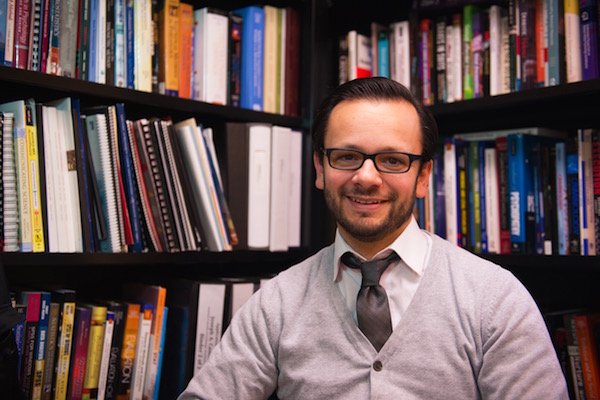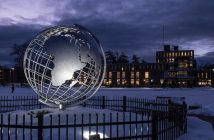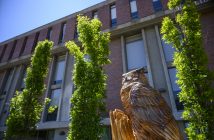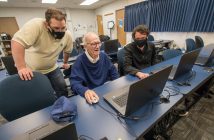Tenure is the highest honor bestowed upon educators. Three University professors who were granted tenure in 2014 reflect on their careers, what drew them to Westfield State and what’s kept them here.
Joseph Camilleri, Ph.D.
Joseph Camilleri, Ph.D., associate professor, has only been teaching at Westfield State since 2008, but he’s left quite the impression on the University so far, particularly the Psychology Department.
After earning his doctoral degree from Queens University in Canada, Dr. Camilleri was offered two options: pursuing a post-doctoral research position or a faculty position at Westfield State.
He chose the faculty position, a decision with which he is content.
“This job also allows me a perfect balance of teaching and scholarship, and so I consider myself quite lucky,” Dr. Camilleri says.
Dr. Camilleri says his favorite aspect of teaching is watching students develop confidence and interest in science.
“Scientific literacy is so incredibly important for people to be critical consumers of information, and so, when students tell me they have a better appreciation and understanding of research or feel inspired to pursue research questions, I feel a great sense of accomplishment,” Dr. Camilleri says.
In addition to teaching, Dr. Camilleri serves as advisor for the Psychology Club, which organizes graduate school information sessions, guest speaker lectures and tours of psychological institutions.
“What I enjoy most about the club is helping students organize events that build community and enhance their educational experience,” Dr. Camilleri says.
Dr. Camilleri also helped develop a new master’s concentration in forensic psychology.
“Criminal populations pose unique issues when it comes to clinical assessment and treatment, and being a big believer in evidence-based practice, I designed the forensic concentration to give students a comprehensive understanding of the theoretical explanations of criminal behavior and best practices in forensic counseling assessment and treatment,” Dr. Camilleri says.
While Dr. Camilleri enjoys the current atmosphere at Westfield State, he is looking forward to watching the University evolve.
“I am excited to see how Westfield State evolves as a public institution,” he says. “There are fascinating developments across campus and stronger ties between Westfield State and the local community. It is a great time to be here.”
Nicholas Aieta, Ph.D.
Nicholas Aieta, Ph.D., associate professor of history, was honored in 2012 with the American Historical Association’s Eugene Asher Distinguished Teaching Award. This honor recognizes outstanding teaching and advocacy for history teaching at two-year, four-year and graduate colleges and universities.
“When I received the notice that I had been nominated, I was pleased that my work had been noted by colleagues but also that external reviewers felt that I was doing something that contributed to the growth of young historians at the collegiate level,” Dr. Aieta says. “I was pleased to win the award, certainly for myself, but also for Westfield State and my department.”
Dr. Aieta says teaching isn’t his only responsibility in the classroom.
“What’s more challenging and more enjoyable is framing classes in a way that leads the students to self-discovery—not only about the history that they are pursuing but about themselves in terms of developing analytical and writing skills,” Dr. Aieta says.
Dr. Aieta, who began teaching at the University in 2008, is a very active presence on campus. He serves as the secondary education coordinator and as vice president of the Westfield State chapter of the Massachusetts State College Association (MSCA).
“As a historian who has taught and researched about labor for a number of years, I believed it was important to take leadership in aspects of union responsibilities,” Dr. Aieta says.
A highlight of Dr. Aieta’s career is seeing his students evolve from their first year to graduating and accepting teaching positions.
“I believe, entering my seventh academic year at Westfield State, that I am seeing an impact of my work in local and regional area secondary schools, as more of my students begin to pursue their professions,” Dr. Aieta says. “It becomes a nice cycle of training young teachers and then finding homes for pre-service teachers with your own students in future years.”
Jennifer Hanselman, Ph.D.
Jennifer Hanselman, Ph.D., associate professor of biology, has been teaching on campus since 2008. She also serves as the faculty athletic representative and partners with Residential Life to participate in residential assistant programming, in which faculty members pair up with residential advisors to host events in the residence halls.
“No matter the campus activity, it is always a rewarding experience to interact with the students outside the classroom,” Dr. Hanselman says.
Dr. Hanselman also worked with local high schools to educate students about biology and science. She coordinated with Mass BioEd to bring the BioTeach program to Westfield State. Two high school groups visited campus and participated in biological inquiry-based lab activities facilitated by biology faculty and students.
Dr. Hanselman said the goal of the program, which she hopes to continue, is to introduce students to science, technology, engineering and mathematics (STEM) fields in an effort to demystify STEM and to promote scientific literacy,” Dr. Hanselman says.
Working in the biology field, she is excited for the campus construction to finish on the new four-level science center. “I am looking forward to all that it has to offer our students,” Dr. Hanselman says.
Off campus, Dr. Hanselman’s research is noteworthy. As paleoecologist, Dr. Hanselman investigates how past climates influenced ecosystems. She traveled to South America around Lake Titicaca, and using data such as fossil pollen, spores and charcoal fragments from a 370,000-year-old core from the lake, she identified four full glacial cycles evident in the data.
She compared that data with data collected from 40 other lakes
in South America to identify how plant communities respond to changes in temperature.
As much as she enjoys conducting her research, she appreciates the opportunity to share that research with her students.
“Teaching is so dynamic,” Dr. Hanselman says. “It is rewarding to work with new students every semester and think of new ways to incorporate exciting new information. The field of biology is rapidly changing. I enjoy sharing current research with my students and hope that I have a small part in inspiring each one of them.” n




